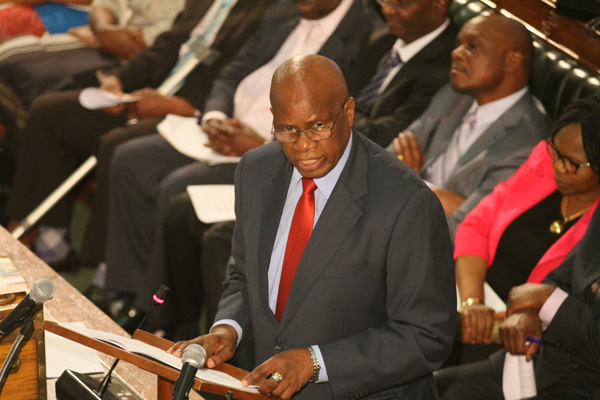
HARARE — It was 1992, and drought-hit Zimbabwe had just a week’s supply of maize left.
The Source
Cephas Msipa was chairman of the Grain Marketing Board (GMB), then the state grain monopoly. For placing an order to import maize, he found himself before President Robert Mugabe and his ministers, accused him of trying to cause alarm and despondency.
The ministers sat in silence as Msipa and Renson Gasela, then GMB head, were berated by Mugabe. It was all a lie, they were told. Our intelligence tells us our grain silos are full. Sitting there and watching was Bernard Chidzero, then Finance minister.
Only one warning was to turn Mugabe. “If you don’t give us the money to buy maize, you people will not be in power; there is no way you can remain in power if people have no food to eat,” Msipa recounts in his memoirs.
It played on Mugabe’s greatest fear, and it worked. Chidzero was ordered to release the money.
Leaving the meeting, Chidzero admitted to Msipa he was aware of how dire the drought situation was. So why had he not said so in the meeting, Msipa asked. Chidzero’s reply: “I cannot be seen to contradict what the President has said.”
- Chamisa under fire over US$120K donation
- Mavhunga puts DeMbare into Chibuku quarterfinals
- Pension funds bet on Cabora Bassa oilfields
- Councils defy govt fire tender directive
Keep Reading
And that is just how Mugabe loves his Finance ministers; quiet, obedient, and in denial.
Finance minister Patrick Chinamasa, a surprise pick for the post, who has worked hard to confound his critics, has had to find that out many times. Last year, Chinamasa announced a suspension of bonuses, but was publicly humiliated by Mugabe four days later.
Now, just under a week after Chinamasa announced a raft of measures to cut government spending, he has once again been slapped down publicly.
On Tuesday, Information minister Chris Mushowe released a statement saying Cabinet had never approved Chinamasa’s proposals, which include job cuts, a suspension of civil servant bonuses, wage cuts, and a range of other austerity measures.
Shocking as it is, nobody really should be shocked.
This is how it has always been with Finance ministers who dare lay out the truth.
In 1997, Herbert Murerwa, then Finance minister, against his warnings, was forced to dole out $50 000 each to over 50 000 war veterans in unplanned gratuities. The Zimbabwe dollar plunged 72% and the stock market crashed 46%.
Murerwa had warned the payouts would bankrupt the country, to which Mugabe responded: “Who ever heard of a country going bankrupt?” Soon, Murerwa was out of work. In 2000, Simba Makoni was appointed Finance minister. It did not take him long to fall foul of the “see no evil” culture.
The economy was in crisis, he admitted in a 2001 interview. “I would have to be foolish to deny what is evident to everybody in broad daylight, even in the darkness of night.”
That was strike one. Strike two came when he tried to introduce a broad range of reforms, which included having to devalue the Zimbabwe dollar, which at the time was artificially overvalued. His boss was livid.
“Devaluation is sinister and can only be advocated for by our saboteurs and enemies of this government,” Mugabe said in 2002.
That September, Makoni left his post, and was to later quit Zanu PF and challenge Mugabe in the 2008 presidential election.
After Makoni, Murerwa was reappointed to the post. Again, it did not take too much time before the President was unhappy with him.
Murerwa clashed with Gideon Gono over the central bank chief’s printing of money to fund all sorts of “quasi fiscal activities”; from ploughs, scotch carts to vehicles. Murerwa wanted government to go lean instead, saying in a 2005 speech that “we must all make sacrifices, with ministries living within our economy’s means. There will simply be no magic solutions to our challenges.”
Mugabe did not like that either. Murerwa was too “bookish”, he said.
“They have this word they like using; quasi, quasi. But I tell them that this is the expenditure that we need. We are under sanctions, and there is no room for the type of bookish economics we have at the Ministry of Finance,” Mugabe said.
So, Mugabe needed a replacement for Murerwa.
In his previous role as Industry minister, Samuel Mumbengegwi had threatened businesses, warning he had them “under surveillance” for being “in cahoots” with the opposition. He had also told a meeting of local industry and international financiers that Zimbabwe did not need their money. “We are doing well without them”, he said.
Just the sort of Finance minister Mugabe wanted. And so in 2007, Mumbengegwi got the job. He was perhaps the worst of Mugabe’s picks for the role, stumbling around economic terms in budget speeches, butchering the quadrillions in the inflation data, and generally providing free comic relief to the opposition benches.
What Chinamasa has suffered is not isolated. Many inside government know that one does not survive long if they keep pestering the leadership with inconvenient truths.
Take comfort, poor old Patrick. You are not alone. You are just one in a long list of Finance ministers that have fallen foul of a culture that rewards lies over truth, and appeasement over logic.
There is a reason why Zimbabwean government ministers refuse to tell the truth on the economy, preferring instead to live in denial — it is just how their boss wants them.
By thwarting Chinamasa’s austerity measures, Mugabe and his Cabinet invite inevitable questions over their commitment to reforms underpinning the ongoing re-engagement process with international finance institutions.
Chinamasa has been doggedly pursuing this re-engagement since his appointment in 2013, but after having been cut off at the knees, it’s hard to see the process as anything other than imperilled.












